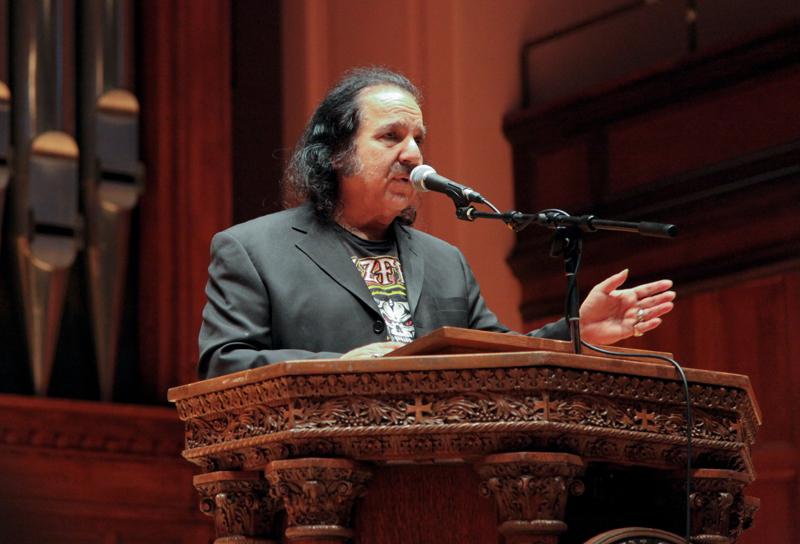Bigger Than You Think: Ron Jeremy on Porn and Society
Ron Jeremy arrived at Oberlin yesterday in order to deliver a lecture regarding the relationship between the adult film industry and First Amendment rights. The world-famous adult film star has been in over 2,000 adult films since he entered the industry in 1978.
April 13, 2014
World-famous adult film star Ron Jeremy delivered a different type of performance last night in Finney Chapel, addressing the relationship between the porn industry and the law. Sponsored by the Oberlin College Republicans and Libertarians, Jeremy’s talk gave a brief history of adult film’s trials with the federal government, discussed current challenges facing the industry and made a few off-color jokes along the way.
Jeremy, who has spoken on over 50 campuses including The Ohio State University and Yale University and has a Master’s degree in special education from Queens College, has become politically active in advocating for the porn industry’s rights in the face of historic censorship.
Born in Queens, NY to a Jewish family, Jeremy displayed an interest in acting and performance at a young age. Before he worked in films, he served as a special education teacher. As an undergraduate, Jeremy majored in theater and began performing in pornographic films in an effort to penetrate the acting world. He has starred in over 2,000 pornographic movies and holds the world record for guest starring in the most music videos as himself — 48.
One of Jeremy’s most notable forays into politics came in 2012, when Los Angeles County voted to pass Measure B on the Nov. 6th ballot, which mandates the usage of condoms in all pornography production scenes that display anal and vaginal sex. Jeremy and other public figures in the porn industry protested, participating in a campaign titled “No On B.” He released a video with fellow porn actor Tera Patrick compar- ing the risks of unprotected sex in pornography to other dangerous, legally permissible jobs.
Jeremy ventured back into the industry’s infancy to discuss the historic difficulties adult filmmakers have faced as a result of obscenity laws. In the 1973 Supreme Court case Miller v. California, the state put porn on trial, claiming that certain obscene films that don’t have “serious literary, artistic, political, and scientific value” will not be protected by the First Amendment. Years later, in the 1982 case New York v. Ferber, the Supreme Court upheld a state law prohibiting the sexual performance of children under the age of 16 in films.
The porn industry has operated lawfully under the provision for freedom of speech in the First Amendment. As Jeremy pointed out, this has also protected entertainment companies in practicing dangerous activities such as drag racing. College senior Taylor Reiners, a member of OCRL and the organizer of the event, said, “Lots of things, including alcohol, tobacco, video games, and even adult entertainment can be abused and have negative consequences. Part of being an adult is recognizing these risks and using responsibly.”
Part of porn’s complexity lies in its free accessibility on the internet. The 18-year-old age restriction is exceedingly difficult, perhaps impossible, to enforce. Many have attacked pornography for its perpetuation of racial and gender stereotypes and glamorized view of degrading and violent sexual acts, which Jeremy said is a result of the “unequal upbringing” of boys and girls and preexisting stereotypes in Hollywood, not products of the adult film industry itself.
Yet for others, pornography has been cited to aid in couples’ sex lives by providing excitement. Some argue it has helped people feel more comfortable expressing their sexuality. Jeremy cites a phenomenon he calls a “standing ovation” in which couples watch erotic content together for some mental stimulation and then leave to practice it themselves. Erotic visual content can teach adults who are nervous about sex some of the “techniques” they could use to make them feel more confident about their participation in sexual activities.
But, as Jeremy reminded the audience, some industry tricks are only for the camera, not the pleasure: “Just because it looks good, doesn’t mean it feels good.”
















